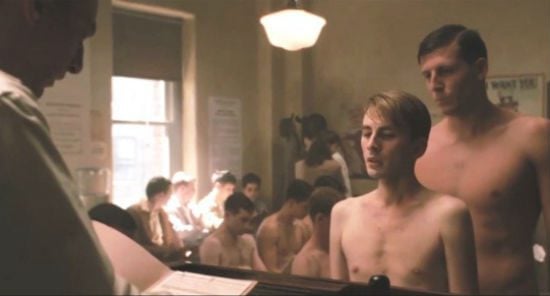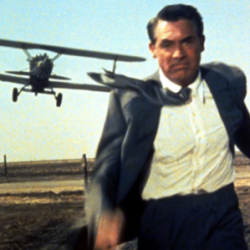Yesterday I mentioned the news that Tom Hanks will be portraying Mister Rogers in an upcoming movie. Some reports on this news said that Hanks will be starring as Fred Rogers, but I don’t think that’s what the filmmakers have in mind. I don’t think that would even be possible. It wouldn’t work.
“The Fred Rogers Story” couldn’t be a movie because it isn’t really a story. Stories involve conflict and choices and changes. Mister Rogers didn’t change. According to the famous Tom Junod profile — the one that inspired this film project — Fred Rogers weighed 143 pounds for almost his entire life and scarcely ever varied his ascetic daily routine. As for choices, Rogers seems to have made them all a very long time ago, and to have committed to them so fully and fiercely that for the rest of his life they didn’t even seem like they were still choices anymore. And as for conflict — long considered the key to stories and to storytelling — well, conflict always turned out to be hard to sustain when Fred Rogers was in the picture. It seemed to flee or to melt away when he showed up.

So I don’t think anyone could make a movie called “The Fred Rogers Story” starring Tom Hanks as Fred Rogers, and that doesn’t seem to be what director Marielle Heller has in mind. The star of You Are My Friend — the main character of the story, the one who will face conflict and make choices and change — is going to be the Tom Junod character. Or, really, a fictionalized version of Junod, who will also serve, of course, as the stand-in for the rest of us. (Junod says he’d like to see Jon Hamm get the part.)
I happened to re-read that amazing Esquire piece after recently rewatching Peter Capaldi’s final scene on Doctor Who, and thus was struck by some of the similarities between these two madmen with their magic boxes. “Never be cruel; never be cowardly,” the Doctor says. “Remember: Hate is always foolish, and love is always wise.” And “Always try to be nice and never fail to be kind.” That works as a character-Bible for the show’s writers, but it could just as easily have been lifted from the lyrics of one of those gentle little songs from the Neighborhood. I rewatched that scene from Doctor Who and started wondering if the Mister, like the Doctor, had kept his true name a secret, because “No one would understand it anyway — except children. Children can hear it, sometimes.”
But the most Doctor Who thing about Fred Rogers, I think, doesn’t involve the actual Doctor. It’s that fun moment that happens every time some new companion or visitor enters the Tardis. They squirm through the doors of the tiny blue police box and then their eyes go wide in awe and bewilderment: “It’s … it’s bigger on the inside!” Mister Rogers had that same reaction every time he met anyone new. You’re bigger on the inside! Isn’t it marvelous? Aren’t you wonderful? And he meant it, too.
I was still chewing on this a bit when I tripped over this post from Richard Beck this morning, “What Is The Right Thing To Do?”
That question — a moral question, a should-y, ought-y question — is often at the heart of stories. The conflict and change and choice facing our protagonist often centers around that question: What is the right thing to do? Will our hero figure it out, and will our hero have the courage or moxie to choose to do it? That’s where suspense comes from, the thing that makes us want to keep turning pages or to keep watching because we need to know what happens next. It’s not really from Hitchcock’s famous bomb under the table — that’s something that happens to the characters, not something they do. Suspense comes from needing to know what they do and what they choose. Will they do “the right thing”?
High Noon is a classic example of that. There’s suspense in the final confrontation between Gary Cooper and the outlaws, but that scene is only about seven minutes long. The real suspense of the previous hour of the movie doesn’t come from kapow! kapow! or from who shoots who, but rather from watching the characters — Cooper and Grace Kelly and Katy Jurado and all rest — as they’re forced to make choices. Will they “do the right thing” or not?
But I think Beck is right when he warns us that “What Is the Right Thing To Do?” isn’t always the best question — whether for our stories or for ourselves. He writes:
More and more I’ve come to the conclusion that, as human beings, we rarely know what is the right thing to do. There are no guarantees. We cannot see into the future. There are things we may be missing.
What’s the right thing to do? God knows, but we rarely do. We are limited, finite creatures.
And yet, we fret, fearing that if we can’t find the right thing to do we’ll end up doing the wrong thing. And that choice — between doing the right thing or the wrong thing — fills us with dread.
So let me make this suggestion. Let’s stop thinking about decisions and choices as being “right” or “wrong.” We just won’t know. Can’t know.
So instead of thinking about a choice as right or wrong — instead of moralizing our decisions — let’s ask if a decision is wise. Is this a wise thing to do? I think the wise/foolish frame is better than the moralized right vs. wrong frame.
Rarely will we know, with absolute certainty, what is the right thing to do. But is it within our capacity to make wise rather than foolish decisions.
Of course, it’s also within our capacity — and within our tendency — to rationalize our choices in the most self-serving of ways. Wise can easily get whittled down to prudent, which gets further reduced to practical, and then down to expedient, and then to convenient, and then to whatever’s easiest. And before you know it we’re all getting on board the last train out of Hadleyville.
So I think Beck’s advice still requires moral considerations, but it approaches them in a more insightful, more fruitful, and less daunting way.
But we weren’t talking about morality, per se. We were talking about stories. And I think Beck’s rumination on the wisdom of wisdom suggests something interesting about storytelling.
The problem with stories about characters like Marshal Will Kane is that they can’t help but remind us that they are fundamentally morality tales. That can make them ponderous in several ways, in part because it saps a bit of their suspense. Will Gary Cooper do the right thing? Or course he will, because he’s Gary Cooper. (Or because he’s Jimmy Stewart. Or because he’s Tom Hanks.) Give us a character whose defining trait is that they always choose to do the right thing and put them in a story that asks whether or not they’ll choose to do the right thing and we’re not really left with much to wonder about what’s going to happen next.
The possibility of real suspense — of wondering what choices will be made, and of needing to know what happens next — is better served if we come at their morality tale from another angle, by avoiding, as Beck advises, that daunting, moralistic question of “What is the right thing to do?” I think that’s why I enjoy stories about the Doctor. S/he’s not perpetually worrying about that dreadful question, but, rather, about “Never be cruel; never be cowardly.” Such characters remain compelling even when their choices seem like a long-settled foregone conclusion. Characters like that are moral, but in a way that’s more concerned with good than with right. Their defining traits aren’t “Always Does The Right Thing,” but are located instead in their embodiment of some other virtue — whether it be Beck’s suggestion of wisdom (“love is always wise”) or something else, like courage, or kindness, or justice.
Think again of Fred Rogers. Or of Steve Rogers. But I think such archetypes of virtue should be the exception, rather than the norm. They can seem a bit unapproachably beyond us mere mortals. We’re not saints or superheroes or Timelords, and we can’t just will ourselves to become the Doctor or the Mister or the Captain. So it’s usually better, I think, to envision a character not as the embodiment of some defining virtue, but rather as someone who wants or aspires to be that. Show us what it is they want to be, then give them a chance to be it and we’ll all see how they do.
That’s also how it works out here in real life, too, of course. We can’t and don’t really spend all of our time pondering “What is the right thing to do?” but rather we decide what it is we want or aspire to be. Then we look for our chances to be that and we see how we do.
This, too, creates an element of suspense. We can’t help but keep watching to see what we’ll choose to do next and how we’ll turn out in the end.
















